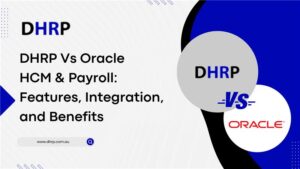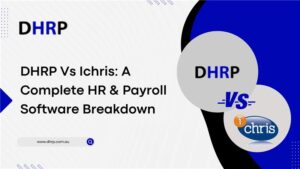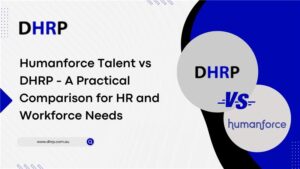AI isn’t a buzzword; it’s a business advantage.
In our previous discussions, we explored how artificial intelligence is reshaping industries and software, from “D365 AI-Powered ERP transforms the Retail industry” to “Top AI innovations transforming Dynamics CRM and ERP software,” and “The role of AI and Machine Learning in modern ERP systems.”
Today, let’s shift focus to another crucial area: human resources.
Just as ERP and CRM are undergoing a major transformation, driven by advancements in AI and automation, the HR profession is also undergoing a significant transformation. From recruitment to employee engagement, AI in modern HR and payroll systems is changing the way organisations operate and make decisions.
But how exactly can AI in modern HR systems be beneficial for your organisation?
What is AI in HR?
The use of AI technologies to transform conventional HR procedures and functions is referred to as artificial intelligence (AI) in human resources (HR). To automate repetitive tasks, gain deeper insights from HR data, and support informed decision-making throughout the organisation, a combination of algorithms, machine learning models, and intelligent systems is employed.
By reducing conflict and freeing up HR implementation specialists to focus on more nuanced or innovative personnel matters, these technologies also enhance the employee experience.
AI in HR utilises a range of technologies that can analyse vast amounts of data in real-time, identify patterns, generate content, and simulate human-like interactions.
By enabling them to transition from primarily administrative to more strategic roles within organisations, these capabilities are revolutionising the way HR departments function.
Challenges in HR and How AI Can Help
The AHRI and QUT 2024 State of AI in Australian Human Resources report reveals the dual reality of AI in the Australian human resources sector.
Although there is excitement about its potential, major obstacles are impeding its widespread adoption in Australian workplaces.
Key Challenges
1. Limited AI Knowledge:
Only 3.8% of HR professionals consider themselves highly knowledgeable about AI, and 30.5% have only a basic understanding of the technology. HR’s capacity to impact AI adoption and integration in more extensive business processes is hampered by this disparity.
2. Slow Organisational Adoption:
54.7% of those surveyed said that their company’s adoption of AI was either nonexistent (17.4%) or slow (37.3%). In a similar vein, 51.2% of respondents claimed that their HR department was either slow to adopt AI or not using it at all..
3. Minimal Training and Policy Frameworks:
- Just 16.9% of respondents claimed that their company offers AI training to staff members.
- 47.5% reported receiving no training at all.
- A formal policy or set of guidelines for the use of AI in HRM is lacking in nearly 50% of organisations.
4. Low Recruitment Use:
Just 3.4% of organisations use AI to screen or shortlist candidates, despite the availability of tools. In interviews, 7.2% use AI “somewhat,” and less than 1% use it.
5. Ethical Uncertainty:
- The claim that AI is more reliable than human judgment was rejected by 61.7% of respondents, who disagreed or strongly disagreed.
- The claim that AI decisions are more transparent than human ones was rejected by 39.5% of respondents.
- Just 23.4% of companies had examined whether using AI had a negative impact on particular employee groups.
How AI Can Help HR
Despite the difficulties, HR specialists believe that integrating AI in HR and Payroll Solutions Australia offers significant opportunities:
- Boost in Productivity: According to 86.3% of HR professionals, AI will increase hourly output.
- Enhanced Job Performance: 81.3% of respondents concur that AI will enhance job performance.
- Decreased Stress: According to 62.1% of respondents, AI can lessen stress at work.
- Increased Job Satisfaction: According to 60.8% of respondents, AI can raise general job satisfaction.
Currently, AI is primarily utilised for administrative tasks, such as creating policy documents and job advertisements.
- Controlling training completion rates and reminders.
- Putting together employee comments.
- Using chatbots to respond to simple HR questions.
AI has the potential to free up time for strategic endeavours as well. However, only when HR professionals are empowered through clear ethical frameworks, supported environments, and upskilling will the full value be realised.
The best HR software for businesses with AI can supplement human judgment in HR decision-making, rather than replace it, when applied properly.
AI in HR Software - Top Benefits for Organisations
When your organisation is taking one step ahead with AI in modern HR systems, these are some of the top benefits to get:
1. Recruitment and Talent Acquisition
HR has consistently struggled with hiring. AI in Modern HR Systems has made hiring more intelligent and effective. In a matter of seconds, algorithms can sift through thousands of resumes and identify the best applicants based on their qualifications and experience.
By allowing recruiters to predict a candidate’s future performance or likelihood of fitting into the company culture, predictive analytics elevates this to a new level. In order for HR to spend more time with candidates and less time on administrative tasks.
For instance, some HR platforms now feature AI tools that utilise language analysis to craft more engaging job postings, aiming to attract top candidates.
2. Employee Engagement and Experience
Employee experience is more crucial than ever in the post-pandemic world. Chatbots and virtual assistants driven by AI are transforming how staff members communicate with human resources. Do you need to see how much you have left for the holidays? Are you trying to find training opportunities? Without waiting for HR’s office hours, AI can provide you with immediate answers.
HR software for Australian SMEs that utilises AI also enables sentiment analysis and real-time pulse surveys, allowing businesses to gauge employee satisfaction and resolve issues before they escalate into problems. It also enables automating leave management with Dynamics 365 and other solutions.
3. Workforce Management
Artificial intelligence (AI) in modern HR solutions for Australian businesses is enhancing the intelligence and accuracy of workforce management. Using historical data, seasonal trends, and even weather forecasts, advanced scheduling tools employ artificial intelligence (AI) to predict staffing needs. Thus, you obtain the appropriate coverage without overburdening workers.
AI can also optimise productivity by analysing workflows, provide digital record keeping for HR compliance in Australia, and suggest improvements.
Conclusion
AI in Modern HR Systems is no longer a future concept—it’s a practical solution for improving productivity, engagement, and decision-making across all HR functions.
From recruitment and workforce planning to employee satisfaction, AI brings smarter workflows to every level of HR operations. For businesses seeking a competitive edge, adopting the best HR software for small businesses in Australia means choosing platforms that combine automation with intelligent insights.
At DHRP, we offer AI-driven HR and Payroll solutions tailored to meet the growing needs of Australian businesses—helping HR teams work more efficiently and focus on what matters most.
FAQs
AI in Modern HR Systems refers to the use of technologies like machine learning and automation to enhance HR tasks, including hiring, employee engagement, and workforce planning.
AI tools like chatbots and virtual assistants provide instant support for HR queries, while sentiment analysis helps companies address issues before they grow.
No, AI supports HR teams by handling repetitive tasks, allowing professionals to focus on more strategic and human-centred activities.



































































































